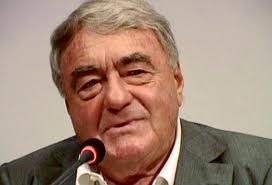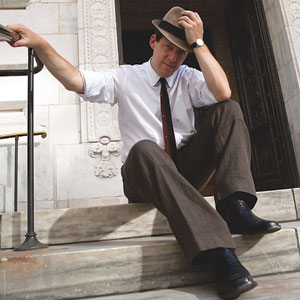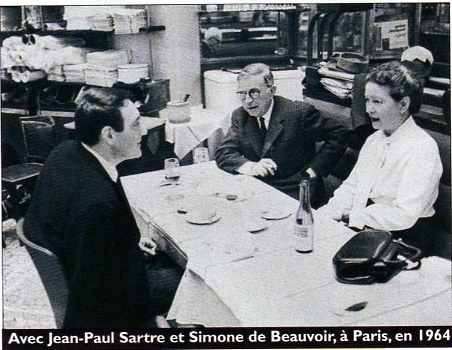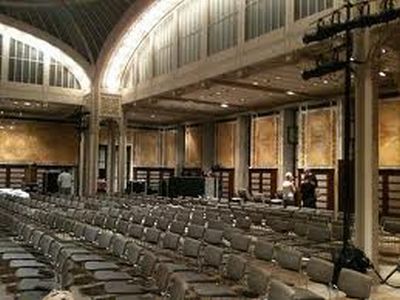Claude Lanzmann is interviewed by Paul Holdengräber
March 21, 2012 at 7:30 PM
Celeste Bartos Forum auditorium
New York Public Library
5th Avenue and 42nd Street
Roy Lisker

Claude Lanzmann
+ The speakers were introduced by Antonin Baudry, Cultural Counselor at the French Embassy, Permanent Representative of French Universities in the United States. After a cynical comment about French bureaucrats (they are paid more the less work they do), he launched into a hymn of praise to the glories of Claude Lanzmann: "Ladies and gentlemen: This is not a man; this is a LION!" Lanzmann is indeed impressive, but I suppose that he must have been embarrassed at being called a lion, a hero ,a philosopher, adventurer, poet and lots of other things. Finally, Baudry enumerated 7 reasons why he loved Claude Lanzmann, all superlatives. The two personal items were a mutual respect for Leibniz, and their fondness for military chess.
After the introductions Claude Lanzmann and Paul Holdengräber walked onto the high platform down at the front of the auditorium. Here two rather uncomfortable cushioned easy chairs stood waiting for them, separated by a small round table holding a bouquet of about 3 flowers awkwardly stuck into a flask.
Paul Holdengräber in his turn invoked the number 7. In the past he'd asked his guests to provide a short biographical sketch to describe themselves and their work. Recently he began the practice of asking them to put their description of themselves into 7 words (Artur Rimbaud did it in 4 :"Je est un autre"). The list that Lanzmann gave him is: Juif, Trace, Peur, Mort,Vie,Honneur,Amour (translated as: Jew, Trace, Fear, Death, Life, Honor, Love).
The word "trace" is enigmatic, but appears to mean "to be on the traces of someone or something". Without question Claude Lanzmann has been an indefatigable "tracker" all his life.
Claude Lanzmann is 86; gone to fat but still very strong, with a broad head, warm weathered face, measured gait, and the air of a man who has been around and done much in his life. Paul Holdengräber must be about half his age, somewhat thinner with closely cropped brown hair and the relaxed manner of a good interviewer. He's also perfected the technique of introducing diversions into his questions so as to return later to the principle concerns of the interview. He has a Germanic name; despite the information that he is the son of Austrian immigrants and was born in Texas, he did have a noticeably 'Continental' accent. With a bachelor's degree from the Catholic University at Louvain, Belgium, it is not surprising that he has a good command of French. For the benefit of the audience they spoke in English (Lanzmann is also fluent in French, English and German). When Lanzmann struggled for a word he gave it to Holdengräber in French, who immediately supplied the English equivalent. Example: echafaud in French, scaffold in English (If this sounds grisly it's because the subjects of the guillotine and capital punishment, which open the pages of Lanzmann's autobiography,took up the first fifteen minutes or so of the interview.)
All of them , Claude Lanzmann, Paul Holdengräber and Antonin Baudry, wore the same kind of drab blue civil servant suit with dark shirt and dull tie that seems to be à la mode for public speakers in France.
People who know about Claude Lanzmann don't need to be reminded of the important work that he's done and the interesting life he's led. For those who don't, suffice it to say that, starting in the early 50's, he was the collaborator with Jean-Paul Sartre on his magazine Les Temps Modernes , of which he is still the editor today. In some sense he is the last of the existentialists. He is an expert on Leibniz, (putting him in the company of someone as thoroughly different as the late Dirk Struik) and deeply versed in German philosophy. Only a few years after World War II, he was lecturing on "Leibniz and Stendhal" in the Freie Universität in the French Zone of occupied Berlin! (The connection is obvious: The Red and the Black is the definitive textbook to illustrate JP Sartre's notion of "bad faith"). The general public know him as the writer-director-producer of the 9 hour TV documentary of the Holocaust, "Shoah".
Simone de Beauvoir, JP Sartre and Claude Lanzmann,circa 1964.
Anyone who has trouble identifying who is who should contact me and I will set them straight.
More details, such as the domestic trio of Lanzmann, Sartre and Simone de Beauvoir, his very bold journalism both in and outside France, and his strong opinions on Israel , can be obtained from reading his autobiography, "Le Lièvre de Patagonie" recently translated by Frank Wynne, as "The Patagonian Hare" (Farrar, Straus and Giroux) and the subject of an article in the latest issue of The New Yorker.
The Celeste Bartos Forum is on the ground level of the great New York Public Library building at 5th Avenue and 42nd St. Entering from a dimly-lit narrow corridor one is unprepared for the elegance, the high vaults and sheer amplitude in all dimensions of this auditorium. It is the pinnacle of the Art Deco style of the end of the 19th century. One would not be surprised to learn that it had originally been part of a grand train station. Pillars surround the room like the supports of a cloister. Great tapestries and pictures cover the walls. Bright lights in glass bubbles promenade in cycloid arcs on panels around the ceiling, like necklaces of jewels in a subterranean palace. At the very center of this ceiling stands a large bluish translucent skylight, reinforcing the association with a train station.On the ground the rows of chairs were spread out in mildly curving arcs.All 400 seats of the auditorium were filled.
At the front of the auditorium stood the very high raised platform on which the speakers would be seated. At each side of this platform stood large film screens on which were projected images of previous guests of the LIVE at the NYPL series, (which Holdengräber directs) : Toni Morrison, E.O. Wilson, Eric Kandel, Werner Herzog, Joan Didion,and others (No Roy Lisker: there are, after all, advantages to being published!)
Media crews cruised through the aisles. They'd place klieg lights at the back. Their brutal illumination had no effect on the audience, but they were causing real suffering to the eyes of the 86-year old Lanzmann. Holdengräber asked the crews to lower the intensity of these lights, but the request was ignored. As a result Lanzmann kept his face in a permanent left profile to the audience to shield his eyes. Not much respect for a fellow journalist described as a "lion among men"!
Lanzmann made the inevitable comparison with a Gestapo dungeon. Among all 7 words of the self-description, the most significant for him was "fear". All of his life he's confronted fear, and written about it: "I've always been obsessed with fear." He said, "with what I myself would do under the tortures I've described in regimes around the world. I can't answer that because I've been fortunate enough that this hasn't happened." With a significant nod towards the klieg lights he added " But right now I'm sweating." The audience laughed, the media representatives were too dense to get the point. Nothing new there.
Although war, prejudice, torture and genocide have been the stuff of his journalism over the years, he has never been an exile, prisoner of war or spent time in jail (at least he never mentions it in his autobiography). He has been a fugitive and a soldier for brief periods only. His military experience consisted of several missions for the Resistance as a high school student, and a number of small skirmishes against the retreating German army in Auvergne. All this must be attributed to luck; at least he's never stayed away from situations in which these were likely possibilities.
Altogether a complex person : at the same time he is also fascinated by militarism. He writes with admiration about both the German and the Israeli armies, and it is clear from the autobiography that he would have enjoyed being a combat pilot.
Furthermore a strong streak of morbidity goes through all the projects of his career. He appears to share this with the other existentialists: one need only read the passages in "The Patagonian Hare" in which he describes the intense fascination with which Simone de Beauvoir watched the bullfights in Spain.
By the time the program began at 7:30 the auditorium had completely filled up. I'd come too late to get the seat I wanted, about 4 or 5 rows from the stage, so I settled myself onto a chair on the 8th row,to the right of the speakers.
Directly in front of me sat an elderly man dressed in a pale suit. He was encouraging people on all sides of him to read some printed sheets he was passing around . These held excerpts from a book by his wife claiming that every French intellectual of the 30's and 40's was a Quisling, a collaborator of either Hitler or Stalin. The pages carried the usual long list of names: Gide , Claudel, Picasso, Cocteau, Sartre, Malraux, Piaf, and so on. Coco Chanel was not included because she'd always been openly right wing. His wife's thesis, in other words, was that all French intellectuals are hypocrites. A very tired thesis, paraded out by people anxious to denigrate one of the great intellectual traditions of the Western world; it must be the case that people wrote denigrating tracts like these in ancient Greece and the Renaissance. Totally lacking in subtlety and making no allowance for context , it is successfully refuted by historical studies such as Herbert Lottman's "The Left Bank: Writers, Artists, and Politics from the Popular Front to the Cold War".
I learned that he and his wife hold a special grudge against Jean-Paul Sartre. I readily admitted that the great philosopher had clay feet (read for example Hazel Rowley's memoir on Sartre and de Beauvoir : "Tete a Tete") , though he must have done something for mankind in his spare time. Now the gentleman wanted my opinion as to whether Claude Lanzmann ought to be placed on the same list.
Well ; I do know a thing or two about Lanzmann. I actually spoke to him once, around 1971, at the offices of Les Temps Modernes which published several articles of mine. He counseled me to stay in France rather than go back to the US and face a jail term for war resistance. I made the right decision by going back, but his advice was based on decades of covering the horrors of political imprisonment around the world. Fortunately the US is not quite there yet.
Yes, Claude Lanzmann was a hero worshipper of Sartre, even after Sartre bore a not insignificant share of the responsibility for his sister's suicide. However, it is most unlikely that he ever was a collaborator with the Nazis or the Communists. While Sartre was publishing "Being and Nothingness" with the imprimatur of a swastika on the cover, Lanzmann and his father were hiding in the mountains of the Auvergne to escape the Germans. His father commandeered a local maquis allied to the Communist party; the Communists betrayed him, virtually stabbing him in the back. Claude Lanzmann himself was put on the CP hit lists, slated for execution. The account in his autobiography of how he got himself taken off the list is not entirely convincing.
Over the 50's and 60's, following many reality checks in East Germany , China, Korea and the French CP, Lanzmann came to detest the Communists, even as his proclaimed hero, Sartre, was sticking up for them despite the evidences of the purges, the Gulag and the repression of revolts in the satellite nations of Eastern Europe. Tarnishing Lanzmann with the same brush as his mentor will not be a simple task.
Lanzmann is, however, very rigid and militant when it comes to defending Israeli nationalism (I avoid using the word "Zionist" even as I avoid using the word "gay" and many other words that have worn out their welcome ). There is a hard-core establishment in France of right-wing Israeli nationalists among ostensibly left-wing Jews, including people such as Claude Lanzmann, Alain Finkelkraut and Monica Canto-Sperber , director of the Ecole Normale Supérièure. These influential Jewish intellectuals unfortunately act as if the Palestinians (and Arabs in general) do not deserve the basic civil rights guaranteed to other citizens or residents of France, and would no doubt like to see them all expelled. This cannot be altogether true of Lanzmann however, who edited an issue of Les Temps Modernes in the summer of last year "Les temps modernes, dossier spécial "Soulèvements arabes", numéro 664, mai-juillet 2011" with significant contributions from Middle Eastern authors.
When I came to this talk I was apprehensive of the possibility that there might be manifestations of extremism from both Left and Right, from Israeli nationalists to Chomskyite hate-Israel demagogues, who might try to destabilize the meeting. There was also the possibility that Holocaust victims hostile to Lanzmann's interpretation of history in "Shoah" might set off protests.
Yet the round table conversation proceeded without actions from any of the political factions that might have wanted to disrupt it: fascists, anti-fascists, Stalinists, Maoists (In his biography, Lanzmann does not conceal his decidedly unfavorable opinions about the regimes in North Korea and China), self-styled Zionists, Intifadists, or Feminists : despite his long relationship with Simone de Beauvoir, Lanzmann is no better nor worse in this regard than the normal run of his countrymen.
Claude Lanzmann is of an earlier generation. Even his antagonists concede that he's done some exemplary work. Even Hazel Rowley, whom I met in Paris a few years ago and who has no reason to like him , agreed that he'd done some good things. Furthermore, this conversation was taking place in an auditorium of the New York Public Library, a haven for genteel book-lovers. The response would certainly have been very different in a meeting hall like the Mutualité in Paris.
Lanzmann has always had a mischievous side. It's one of the things that make him sympathetic for me: so do I. Speaking of the translation of his biography, he let the audience know that the translation by Frank Wynne for Farrar, Straus and Giroux was very bad ! In fact, so he claimed, he had to go through the manuscript and change things in almost every line. Now, so he asserts, the translation is okay!
In general, Lanzmann proved himself to be as entertaining as a speaker as he is as a writer. Little prompting from Paul Holdengräber was needed to get him to open up. Before entering upon their heavy duty discussion of "Shoah", they visited the pages of The Patagonian Hare to invoke some of its many comic episodes: Lanzmann's description of his mother, whose apparent complete ignorance of the effects of her behavior on others came close to undoing the heroism which allowed her to survive in Paris all during the Occupation; an account of how he survived in Paris after the war by stealing large volumes of indigestible tracts on philosophy; what happened when he was caught (Holdengräber neglected to mention the even more comic scenes in which the adolescent Lanzmann went about France in a Catholic priest's soutane, soliciting contributions for an unspecified "charitable organization" !)
Then there was the letter Lanzmann sent to Ahmadinejad in Iran, explaining to him why his denial of the Holocaust was factually incorrect; and a re-enactment of the scenes of himself dictating his autobiography to a computer then to a secretary; he's never learned to type.
Most of the interview of course was serious, even grim, as befits the character and content of "Shoah".They discussed issues such as why the absence of corpses on the grounds of the extermination camps is not evidence (as understood by the Holocaust deniers) that the Holocaust didn't occur; the morality, pro and con of the Zonderkommandos, the inmates of the camps charged with all the grisly tasks of cremating the corpses (Lanzmann considers the opinions of people who think they should have committed suicide to be "obscene"); why he felt that he had to force Abraham Bomba, the barber who shaved the women in Auschwitz, to break in tears before the camera . "Shoah, he stated, " is not a mere narration of facts, it is a re-incarnation of history".
Paul Holdengräber had some trouble dealing with this way of interpreting "incarnation" or "reincarnation"; although I, and I think most of the audience, understood perfectly well what he meant: the Aristotelian catharsis. Lanzmann sees Shoah as a kind of catharsis. Abraham Bomba himself thanked Lanzmann for forcing him to relive and recount his unbelievably horrible experiences.
It was not an appropriate occasion for probing of course. Paul Holdengräber could have asked many more pointed or embarrassing questions, but chose not to. As I've stated, he is a natural born interviewer. Among the questions he could have raised were:
-Why did Lanzmann sue Grasset, (publisher of the French translation of Hazel Rowley's "Tete a Tete") 70,000 Euros for defamation, when the book simply reflects what has been written many times over in other memoirs? The translation of the book was pulped in France. It is available here in English, while 4 pages were removed from the British edition. Further details, many of them less than favorable to Lanzmann can be read in the article published by Hazel Rowley in The American Scholar
- What about the suicide of his sister at the age of 36? Did this not lead him to question the complex overgrowth of quasi-incestuous involvements between Sartre, de Beauvoir, Lanzmann and other more vulnerable victims that were sucked into their spider's web?
-Was he really always the hero of the stories he tells in The Patagonian Hare? Or should we excuse him because they are great stories?
-What about this rigid support of Israel, right or wrong?
-Very often, in "Shoah", Lanzmann asks leading questions that clearly insinuate that the people he's interviewing had to be anti-Semites, if not outright Nazis. Was he aware of this tendency?
- How could Lanzmann continue to work with Jean-Paul Sartre on Les Temps Modernes despite Sartre's obstinate denial of the evidence coming out of Russia of a ruthless police state?
-There's a lot of sexual vanity in "The Patagonian Hare". How much should we take at face value?
- Could he elaborate on his reaction to the mutual suicide, in 2007, of André Gorz and his wife Dorine (suffering from terminal cancer)? In Le Monde he characterized it as "an act of awe-inspiring beauty".
Although Paul Holdengräber avoided these and similar tough lines of questioning, he also did not indulge in flattery. He kept an even course on the basic issues. The achievements of Claude Lanzmann are real enough and did not need the unction of flattery of the sort that Antonin Baudry had supplied. All and all it was a profitable evening, a chance to share a few hours, with one of the major figure in European letters, journalism and politics.


